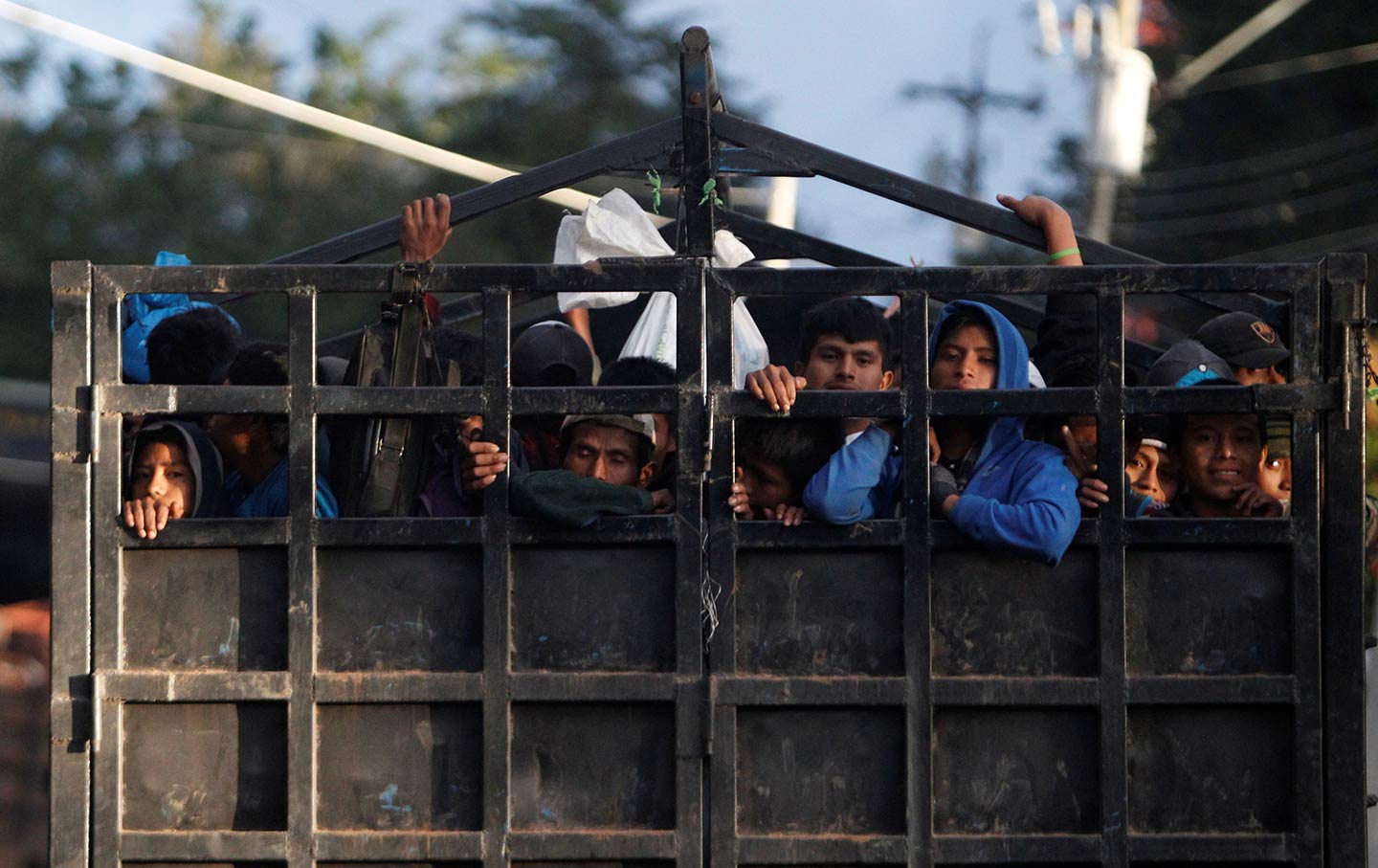
Central American migrants arrive inside a truck to Agua Caliente, Honduras, on December 22, 2016. (Reuters / Jorge Cabrera)
As his price for not deporting roughly 800,000 “Dreamers” who came to this country as children, Donald Trump demands an escalated war against immigrants, topped by his nightmarish 2,000-mile wall along the Mexican border. Democrats have said no. Whether or not some sort of deal is eventually struck, the country will remain deeply divided over undocumented immigrants from the south.
Unfortunately, though, that debate is entirely focused on domestic policy—how to treat the undocumented after they have arrived. Democrats, thinking Latinos will vote for them, want the newcomers to stay. Republicans, fearing Democrats are right, want them sent back. Employers want their cheap labor. Workers fear their wage competition. The clash of these agendas further inflames simmering social tensions over racism, police tactics, and cultural identity, which in turn feed Trump’s reactionary base.
Lost in these US-centric arguments is the role of our foreign policy in creating the conditions that push people in Central America and Mexico to make the long, arduous, and frequently fatal trek north.
For at least 150 years, the United States has intervened with arms, political pressure, and foreign aid in order to protect the business and military elites of these countries who have prospered by impoverishing their people.
Still, illegal immigration from the region remained modest until the 1980s, when the US government and its neoliberal collaborators at the IMF and World Bank began imposing policies on the region that favored large multinational corporations, undercutting the small farms and businesses that had supported the working poor.
Meanwhile, many of the oligarchs became partners in the growing narco-trafficking business. Protected by government officials, criminal gangs have spread throughout the region, adding threats of kidnapping, extortion, rape, and murder to the daily life of people struggling to make a living. A young Guatemalan recently told me: “Unless you are connected to one of the families that run this country, there is no future here. Either you work for the narcos or go north.”
The US response has been a War on Drugs that provides these same oligarchs with political protection and more weapons. In 2009, for example, the Obama administration ensured the success of a coup by the Honduran military against an elected president whose modest social programs of food and education for the poor had enraged the ruling class.
Since then, US aid to the Honduran oligarchs has more than doubled. Yet two-thirds of Hondurans live in poverty. Large numbers inhabit shacks without toilets, and can’t afford to buy shoes for their children. And the murder rate among Latin American countries is second only to that of El Salvador, which has received even more US aid. Five years after the Honduran coup, the number of children illegally crossing into the United States increased by 1,272 percent.
The ruling class in Mexico, despite that country’s greater size and nationalist culture, has a similar relationship with us—to similar effect. The 1994 North American Free Trade Agreement, sold to Congress as a way to keep Mexicans home, threw millions of peasants and small businesses out of work. Illegal immigration from Mexico doubled.
Over the past 10 years, the United States has given Mexico $2 billion in technology and training, ostensibly to fight drug cartels. Yet, as an international coalition of human-rights groups reported in August, the documented cases of government-connected assassination, torture, and disappearances of activists, journalists, and ordinary people keep piling up.
True, higher fences and more dogs and drones have reduced the rate of illegal crossings. As has a reign of terror against the undocumented—midnight raids, mass deportations, and the ripping apart of families. But that has not stopped the drugs, and it will not stop people from fleeing for their lives. A recent poll reports that one-third of Mexicans (43 million people) would come to the United States if they could. Even if Trump builds his wall, they will find a way over, around, or under it.
We have trapped Latin American migrants between a foreign policy that drives them from home and a domestic policy that drives them back. A humane deal concerning the fate of the Dreamers, although unlikely, would be welcome. But the fundamental conflicts that poison our politics over this issue will remain. If we are ever finally going to resolve how we deal with them here we need to change what we are doing to them there.
Jeff FauxJeff Faux was the founding president of the Economic Policy Institute. His books include The Servant Economy.